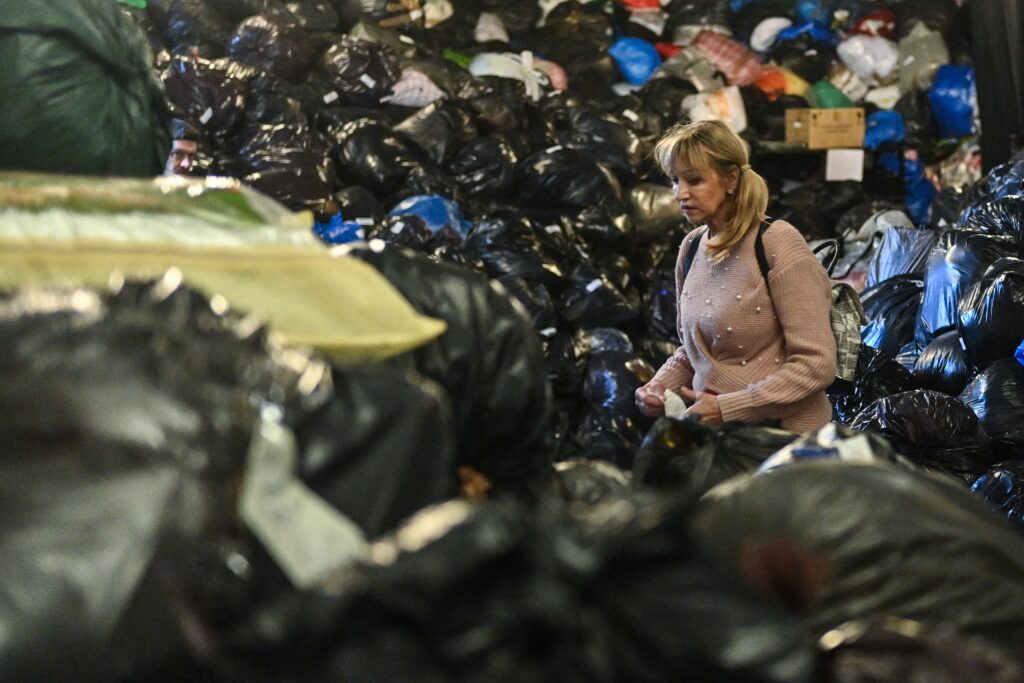Tories urged to show LGBT+ Ukrainians ‘kindness’ by scrapping degrading borders bill

An activist from Amnesty International wears a mask depicting Britain’s Home Secretary Priti Patel. (AFP via Getty/ ADRIAN DENNIS)
“Cruel” immigration plans drawn up by the British government would be deeply damaging to LGBT+ Ukrainians seeking asylum, activists have warned.
The Nationality and Borders Bill has been pitched by home secretary Priti Patel as a way to stiffen Britain’s already hardline immigration policy, finding further ways to criminalise or block altogether asylum seekers entering Britain.
In a “factsheet” the Home Office said the plans will make what is a “broken” asylum system “fairer” by deterring “illegal entry” but continuing to “resettle genuine refugees”.
But to activists, the bill that is hurtling towards parliament has raised alarms given that millions of Ukrainians – LGBT+ people included – are fleeing amid the Russian invasion that has torn through the eastern European country. The majority of queer Ukrainians have sought asylum in countries like Poland and Hungary, where anti-LGBT+ attitudes are on the rise.
As Russia brushes aside the bruising international reaction to the war, the country has only broadened its assault against Ukraine. Bombing civilian areas in the two biggest cities and lining each with a miles-long convoy, showing little sign that Vladimir Putin will de-escalate anytime soon a week on since the invasion.
Patel has, in part, eased the rules for Ukrainians seeking sanctuary amid such rising violence, but Rainbow Migration, a group that supports LGBT+ asylum seekers in Britain, has called on the government to “rethink” the Nationality and Borders Bill.

Ukrainians and other demonstrators gather at Trafalgar Square for a protest in support of Ukraine in London, England. (Rob Pinney/Getty Images)
The agonising bloodshed and dizzying number of displaced Ukrainians have captured, Rainbow Migration said, how “deeply flawed” the bill is and how dangerous it would be if passed, especially with how it would make it even harder for LGBT+ asylum seekers in particular.
For one, LGBT+ refugees would be made to disclose their identity immediately on arrival and must provide evidence, something that can be tricky and time-consuming. Some asylum seekers don’t even know applying on the basis of their sexual orientation or gender identity is even an option for them.
The Home Office already refuses four out of five LGBT+ claims, a figure that has risen over the years, with campaigners warning it will rise if the bill hits the books.
British government urged to rethink ‘cruel’ Nationality and Borders Bill amid Ukraine crisis
Rainbow Migration said that it expects most queer Ukrainians to apply for asylum on the grounds of the conflict, rather than their sexual orientation or gender identity. Nevertheless, the borders bill, if passed, would be detrimental not only to queer Ukrainians but all of those escaping from the drawn-out brutality.
“We are deeply concerned by the situation in Ukraine and have joined other UK charities in urging the government to protect those fleeing any violence in the region,” a spokesperson for Rainbow Migration told PinkNews.
“At the moment, a deeply flawed Nationality and Borders Bill is being debated in parliament which, if passed in its current form, will be harmful to LGBTQI+ Ukrainians and anyone fleeing life-threatening countries seeking safety here.
“We call on the government to rethink this bill and to commit to creating a compassionate, caring asylum process that treats all people that need protection in the UK with kindness and dignity.”
Russia’s invasion of Ukraine has pushed at least 874,000 people out of their homes, according to the United Nations High Commissioner for Refugees, with more than 281,000 escaping to neighbouring Poland and many others to Hungary, Moldova, Slovakia and Romania. Agency officials forecast that the war will lead to “Europe’s largest refugee crisis this century”.
“I have worked in refugee crises for almost 40 years,” commissioner Filippo Grandi told the UN Security Council Monday, “and I have rarely seen such an incredibly fast rising exodus of people.”

A woman drops a bag full of goods among piles of collected supplies to be sent to Poland for Ukrainian refugees, at the White Eagle Club, a Polish social centre, in Balham, south London. (JUSTIN TALLIS/AFP via Getty Images)
LGBT+ Ukrainians, long used to hiding who they are, may be forced to weigh difficult decisions as they flee to Poland, a country that has all but embraced anti-LGBT+ legislation and vitriol. Or do they stay and fight, fearful of Russia seizing more territories in Ukraine leading to their freedoms being restricted and rolled back.
This makes it all the more important, Rainbow Migration said, that Britain opens its doors for LGBT+ Ukrainians without making the process potentially even harder.
“Among other things, this cruel bill will raise the bar for assessing someone’s sexual orientation or gender identity,” Rainbow Migration added, “so LGBTQI+ people seeking asylum will face a higher hurdle to ‘prove’ that they are LGBTQI+.”
Several crucial clauses to the nationality and borders bill that have formed the plan of the government’s immigration plans were struck by the House of Lords on Monday, including clause 11 that would have punished asylum seekers to nearly four years in prison for simply arriving to the country by small boat or truck
In creating a two-tier asylum process, those who entered via such so-called “illegal” routes could have had their claims ruled inadmissible, severing any recourse to public funds and other protections, such as their family reunion rights.
Home Office minister Baroness Williams said nevertheless that there was “no question” of clause 11 “making it hard to be a refugee or otherwise enabling the government to refuse refugee protection”.
Fantastic news! Also means that #LGBTQI+ people won't be penalised simply for not knowing that they could be protected from persecution. Well done all @RefugeeTogether campaigners https://t.co/ZUFwuYll6y
— Leila Zadeh 🧡 (@leilazadeh) March 1, 2022
Peers, however, saw otherwise. Voting 204 against and 126 for the clause to remain.
The Lords also defeated a measure that would have given officials the power to strip people of dual nationality of their British citizenship without warning, something typically only done for those who pose a threat to national security.
The government has long had the power to do this – but never without informing them. Peers voted down clause nine 209 to 193.
As the bill is debated for a third day by the peers on Wednesday, it will soon be sent back to the House of Commons. Lawmakers there can either accept or challenge the changes within the coming weeks.

